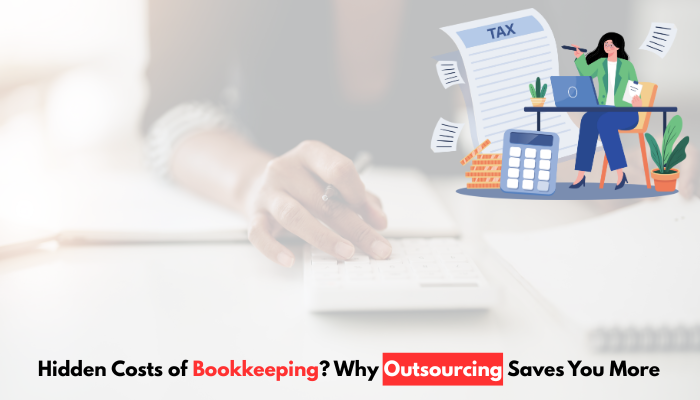Hidden Costs of Bookkeeping? Why Outsourcing Saves You More
Bookkeeping is one of those tasks every business owner knows they must handle but often underestimates. While it seems simple...

Bookkeeping is one of those tasks every business owner knows they must handle but often underestimates. While it seems simple track expenses, manage invoices, record payments the actual work is far more demanding. Many small and mid-sized businesses believe hiring an in-house bookkeeper will give them control and accuracy. What they don’t realize is the array of hidden costs tied to staffing, training, software, and compliance.
This is where the decision to outsource bookkeeping becomes not just a cost-cutting measure but a strategic move.
Let’s break down the hidden expenses that come with in-house bookkeeping and why outsourcing saves you more in the long run.
1. Salaries and Employee Benefits Add Up Quickly
The most obvious cost of hiring a full-time bookkeeper is their salary. But that’s only the beginning. Once you include healthcare, retirement contributions, paid time off, and other benefits, the figure climbs higher than many business owners anticipate.
When you outsource bookkeeping, you pay for the service you need no extra overhead, no employee benefits, and no annual raises. That cost predictability is a huge advantage, especially for small businesses working with tight budgets.
2. Recruitment and Training Eat Into Profits
Hiring a competent bookkeeper isn’t always quick or easy. Between advertising the role, interviewing, and onboarding, recruitment can take weeks, sometimes months. Then there’s the cost of ongoing training to ensure the employee stays up to date with the latest accounting regulations and tools.
By choosing to outsource bookkeeping, businesses skip the hiring process entirely. Outsourced teams are already skilled, trained, and equipped with knowledge across multiple industries. This saves both time and money while guaranteeing expertise from the start.
3. Software, Licenses, and IT Support Are Ongoing Costs
Bookkeeping requires more than just a spreadsheet. You need accounting software, payroll management tools, secure data storage, and often subscription-based applications. Each license comes with recurring fees, plus you may need IT support to keep everything running smoothly.
When you outsource bookkeeping, the service provider covers these expenses. They bring professional-grade software, advanced security features, and technical support all bundled into one cost-efficient package. That means no surprise bills for renewals or IT troubleshooting.
4. Risk of Errors and Compliance Penalties
Even the best bookkeepers can make mistakes, and errors in financial records can lead to late fees, penalties, or even compliance issues. The cost of correcting these mistakes can be significant, both financially and reputationally.
Outsourced teams work with multiple clients and follow stringent quality checks, reducing the likelihood of errors. When you outsource bookkeeping, you’re essentially paying for accuracy, accountability, and compliance elements that protect your business from costly slip-ups.
5. Productivity Loss When Owners Do It Themselves
Some business owners try to cut costs by handling bookkeeping personally. While this may save money upfront, the trade-off is lost productivity. Hours spent reconciling accounts or chasing invoices could be better used for business development, customer engagement, or strategic planning.
- Owners often underestimate the time bookkeeping consumes.
- DIY efforts can cause stress and reduce focus on growth.
- Outsourced services free up valuable hours for decision-making.
By making the decision to outsource bookkeeping, owners can focus on the bigger picture while professionals handle the details.
6. Hidden Infrastructure Costs of an In-House Bookkeeper
An in-house hire doesn’t just need a salary. You’ll need to allocate office space, provide equipment like a computer and phone, and ensure secure data handling systems. All these expenses add up quickly but often go unnoticed when budgeting.
Outsourced solutions eliminate this need. No office space, no equipment, and no additional infrastructure just seamless service delivered remotely. Businesses that outsource bookkeeping effectively cut away a layer of expenses that often remain hidden until they build up.
7. Scalability and Seasonal Flexibility Save More Than You Think
Not every business needs full-time bookkeeping support year-round. Retailers, for example, may see higher transaction volumes during holidays, while consultants might experience quieter months. Paying an in-house bookkeeper a fixed salary doesn’t account for these fluctuations.
With outsourced solutions, you scale services up or down depending on your needs. This flexibility makes outsource bookkeeping not just cost-efficient but also aligned with your actual business cycle.
8. Security and Data Protection Risks Carry a Price Tag
Data security is often overlooked until something goes wrong. In-house systems can be vulnerable without proper investment in cybersecurity measures, backups, and compliance protocols. Data breaches can cost thousands in recovery and even legal fees.
Outsourced providers typically have advanced security infrastructure in place, including encryption and regular audits. By choosing to outsource bookkeeping, you safeguard sensitive financial information without taking on the high cost of building in-house protections.
9. The ROI of Outsourcing Goes Beyond Direct Savings
The benefits of outsourcing aren’t limited to cost reduction. A professional outsourced team can offer deeper financial insights, better reporting, and strategic advice that directly contributes to business growth. Over time, the return on investment from these insights outweighs the apparent “savings” of doing it in-house.
When businesses outsource bookkeeping, they often gain not just accurate records but also valuable guidance on cash flow, budgeting, and profitability services that add long-term value.
Final Thoughts
Bookkeeping is essential, but the hidden costs of handling it in-house can quietly drain your resources. From salaries and software to compliance risks and productivity losses, the expenses pile up in ways that many businesses don’t anticipate.
Making the decision to outsource bookkeeping isn’t just about cutting costs it’s about gaining efficiency, accuracy, and peace of mind. For businesses seeking cost-effective yet high-quality solutions, it’s worth considering trusted providers abroad. In fact, if you’re looking for expertise at competitive rates, many companies successfully outsource bookkeeping services to India, where skilled professionals deliver reliable results at a fraction of the cost.




